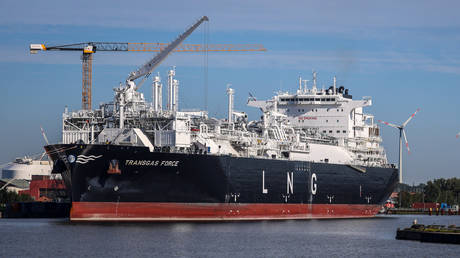
EU countries buying record volumes of Russian LNG
Shipments saw a year-on-year increase by nearly 10% in November
Russian exports of liquified natural gas (LNG) to Europe hit an all-time high of 1.75 million tons in November, the Kommersant business daily reported on Monday, citing data by Kpler.
The previous record was set in December 2022, when Russia exported 1.737 million tons of LNG to the region.
The largest November volumes were reportedly shipped to France and Belgium, which received LNG from enterprises in the Yamal peninsula and the town of Vysotsk. The facilities are operated by Novatek, Russia’s second-largest gas producer.
Overall shipments of Russian LNG to global markets amounted to 2.914 million tons in November, surging 9.3% compared to the same period a year ago.
However, deliveries of Russian LNG to China saw a sharp decline to 0.1 million tons, compared to 0.8 million tons in the previous month.
Dutch Transfer Title Facility (TTF) gas futures for November deliveries were either equal in price or traded higher than spot LNG supplies to Asia on some days, according to independent energy expert Aleksandr Sobko, as cited by Kommersant.
Read more
US aiming to ‘kill’ major Arctic energy project – official
The analyst added that the European market was becoming more attractive due to the significantly lower costs of transportation to the region from Yamal. Sobko noted that China’s CNPC, which purchases Yamal LNG, had previously redirected some shipments from Russia to more profitable markets, while compensating these volumes for the Chinese market from other sources.
Viktor Katona, lead crude analyst at Kpler, highlighted accelerated imports of LNG by China in November, saying the redirection of Russian supplies was not the result of weak Chinese demand, but rather the increased appeal of the European market.
Japan and South Korea continued to receive Russian LNG from the Sakhalin-2 project under long-term contracts with Gazprom. Supplies to Japan in November rose 22% year-on-year to 0.64 million tons, while imports by South Korea saw year-on-year growth of 50% to 0.28 million tons.
For more stories on economy & finance visit RT’s business section

